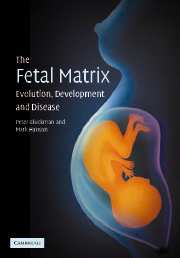Book contents
- Frontmatter
- Contents
- Preface
- 1 Shaping our destiny: genes, environment and their interactions
- 2 Mother and fetus
- 3 Fetal choices
- 4 Predictive adaptive responses and human disease
- 5 Obesity, diabetes and other diseases
- 6 The biology of predictive adaptive responses
- 7 Predictive adaptive responses – critical processes in evolution
- 8 Evolutionary echoes and the human camel
- 9 Improving human health
- 10 Fetal futures
- Further reading and references
- Index
3 - Fetal choices
Published online by Cambridge University Press: 05 November 2011
- Frontmatter
- Contents
- Preface
- 1 Shaping our destiny: genes, environment and their interactions
- 2 Mother and fetus
- 3 Fetal choices
- 4 Predictive adaptive responses and human disease
- 5 Obesity, diabetes and other diseases
- 6 The biology of predictive adaptive responses
- 7 Predictive adaptive responses – critical processes in evolution
- 8 Evolutionary echoes and the human camel
- 9 Improving human health
- 10 Fetal futures
- Further reading and references
- Index
Summary
In the previous chapter we described how the fetus responds to environmental change to aid its survival. Many of these responses are transient and functional, that is homeostatic, responses – for example the cessation of fetal breathing movements to conserve oxygen. Others involve changes in developmental trajectories – for example altered fetal growth to conserve nutrients. The latter often involve irreversible developmental plastic changes and thus have potentially long-lasting consequences. We will pursue this theme in this chapter and also introduce another concept: namely that the fetus might make some adaptive responses not for immediate survival advantage, but in expectation of future advantage after it is born, by changing its developmental programme before it is born. This is the concept we have termed predictive adaptive responses.
Fetal strategies
Fetal development is of course not an end in itself. In evolutionary terms, the sole point of the process of development from embryo to adulthood is to achieve competence to reproduce. The author Samuel Butler made the point well when he phrased the aphorism that the ‘chicken is just the egg's strategy for making another egg’. The embryonic and fetal phases of development must be survived, the fetus must attain independent life at birth and the child must pass through puberty – these are the necessary steps on the trail to reproductive competence. But as we have seen, the birth phenotype can be highly affected by the environment of the developing fetus.
- Type
- Chapter
- Information
- The Fetal Matrix: Evolution, Development and Disease , pp. 59 - 77Publisher: Cambridge University PressPrint publication year: 2004



